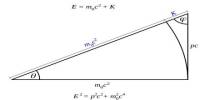Two mathematicians claim that the heart of travel lies at a time when there is no logical inconsistency, so it is theoretically possible for anyone to travel on time and change reality. Unfortunately, time travelers can be disappointed with the results. If time is only the fourth dimension, then it is natural to wonder why we cannot go through it. “Einstein’s theory of general relativity predicts the existence of a time loop or time travel – where an event can occur in both its past and future – theoretically turning its head to the study of dynamics,” said Germain Tobar, an honors student at the University of Queensland.
Many pointed to the so-called “grandparents’ paradox” that this type of travel could not take place. . Numerous science fiction writers have danced around the problems of travelers of their time, carefully changing things in ways that do not hinder their journey. Tobar inspired by the equation that Einstein created to describe the loops of this period. In Classical and Quantum Gravity, he and his supervisor, Dr. Fabio Costa, show that there is no logical need to prevent time-travelers from making trivial changes.
“You traveled on time in an effort to prevent the Covid-19 patient from becoming infected with the virus,” Costa said. “But if you stop that person from getting infected – it will motivate you to go back and stop the epidemic in the first place.” The solutions of this pair imply that the universe will adjust. Although the model they describe in their paper involves a simple world where billiard balls represent jumping against each other, they suggest managing complex human environments in the same way.
“You can try the zero example of a coronavirus patient and prevent the patient from becoming infected with Zero, but by doing so you will catch the virus and the patient will become Zero, or someone else,” Tobar said. Although you can change history, it will only be that way of your existence and want to make a journey that avoids any catastrophe. Similarly, Tobar told IFLScience that a person who tries to get himself into a worm in order to travel on time might miss something, causing damage to one eye, and then they may not be able to notice the hole properly. The example of the epidemic may question potential time-travelers if this journey is worth the effort. Tobar acknowledges this, but argues that the changes may be unpredictable but trivial.
If time travel is possible, we can ask in a version of the Fermi paradox, why future travelers did not come to see us, even to show the events to which they were specially invited. “Although time travel is logically possible, more restrictions can be imposed,” Tobar told IFLScience. “Alternatively, events rearrange around something that might have caused a paradox that didn’t happen, so maybe someone actually came back but the word didn’t come out.” Instead of government-run cover-ups, conspiracy theorists insisted that the laws of physics were hiding the truth.
Tobar added that this work does not provide any guidance on how time travel works. Nevertheless, it may prove effective in other ways. The search for quantum gravity, the theory that would integrate general relativity and quantum mechanics, is the sacred grill of modern physics. Costa told IFLScience that while the paper did not directly assist in the search for quantum gravity, various structures could apply to that search for the dynamics developed on paper.
















